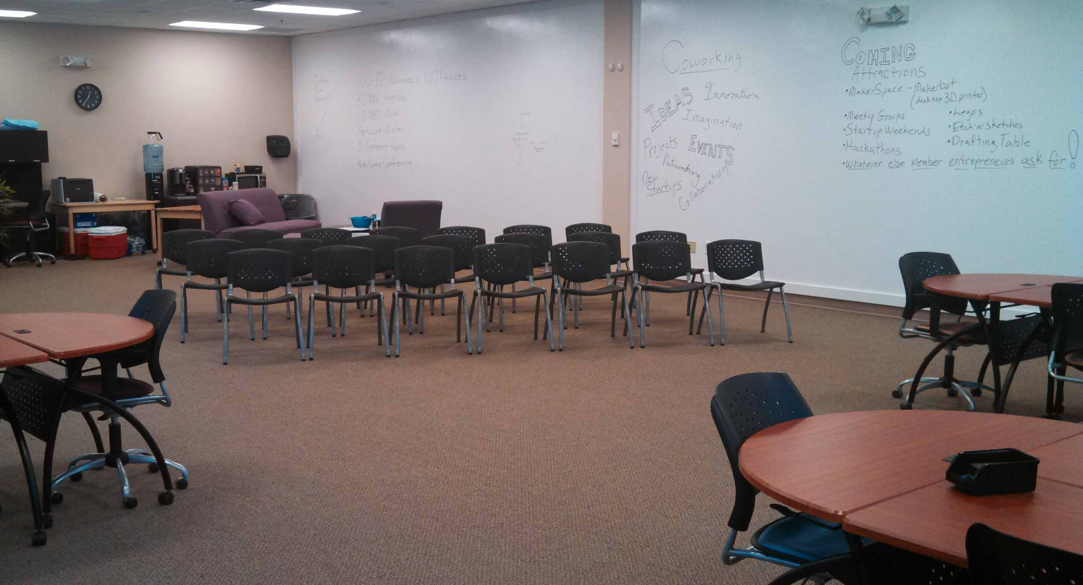Mike Thielke has read the blog posts and heard the lectures and signed up for the newsletters. He knows the first rule of coworking: build the community before you build the space. But Thielke, the executive director of Eastern Shore Entrepreneurship Center (ESEC), isn’t doing that, and he’ll tell you why.
Charged with growing a tech startup community in the more rural-suburban corridor of Maryland’s Eastern Shore, in June Thielke opened up an 1,800 square foot coworking space in a small retail strip off Route 50, calling it hotDesks.
“Anyone who has looked seriously at the coworking model knows you’re supposed to find the community before you ever think about the physical location,” said Thielke, who is self-effacing and smiling during a pair of conversations with Technically Baltimore. “But Salisbury isn’t the kind of city where you can bump into a techie. Yet.”
It’s an interesting twist to a modern coworking movement that is full of purists. That’s not to say that people haven’t already tried the coworking model in even more rural environments, it’s just an acknowledgement that as coworking grows up and arrives in new places, groups are going to stretch the model.
Thielke looks at the bigger cities that pull from the Eastern Shore: Baltimore, D.C. Philadelphia, even Wilmington, Del., and sees that it is access to talent and a density of like-minded peers that attracts this new generation of entrepreneurs — he’s quick to remind that Federal Hill incubator Betamore is backed by the energy of Eastern Shore native Mike Brenner.
If he is to succeed in his mission, he’ll need to find other would-be Brenners and attract, retain and grow them.
“The rural experience is going to have a different translation to making a coworking environment, and we’re trying to make it work,” Thielke said, already eying other Eastern Shore locations.
 So rather than finding the people and then opening the space, he has opened the space and is using it to host events that can attract the people who might know even know what coworking is yet.
So rather than finding the people and then opening the space, he has opened the space and is using it to host events that can attract the people who might know even know what coworking is yet.
- Before launching, Thielke hosted in April the region’s only NASA International SpaceApps challenge
- This summer, Thielke hosted the first meeting of a revived tech committee from the Salisbury Chamber of Commerce. Two people signed up for memberships on the spot, said Thielke.
- During September’s Baltimore Innovation Week, hotdesks will host two events, aimed at pushing for a broader regional identity, including a new TechBreakfast and a maker event.
He is taking other lessons from the coworking stewards from around the world: he’s letting his fledgling membership base help establish the culture (including a cell phone drop off to increase concentration); he’s seeing hotDesks as a shared driver to source community not to drive real estate profit (seats are $150 a month) and he’s established a mission: “We’re telling people we want to be a home for those who say ‘I want to be working on my business not in my business,” he said.
One advantage of being so early in building a community is that you can take the best successes of more advanced markets, like Baltimore, and house them together. hotDesks has the space to experiment with a small hobbyist maker corner and is an eager partner to bring the StartupWeekends and meetups that established city tech markets take for granted.
Still, like whenever you start a new, small, narrow and previously untouched community, it’s been slow going, Thielke said. Coworking spaces have failed before and others linger short of the energy others had wanted — think the Beehive in Canton that is often quiet on an average day, despite heavily used offices around it.
Fewer than a dozen regular paying members are signed up for hotDesks now, a space that’s ready for 45. The big open main room, adjacent to smaller break out rooms, are still quiet, but it’s a big experiment for Thielke’s mission of creating a creative and entrepreneurial spirit 100 miles from the hubs of innovation in Baltimore city.
“No can visualize something like this on the Eastern Shore. I have to create the vocabulary, so that’s what we’re doing,” said Thielke. “We’re going to have a different membership base than the city coworking spaces. We’re more scattered here, but that might mean it’s even more important.”







